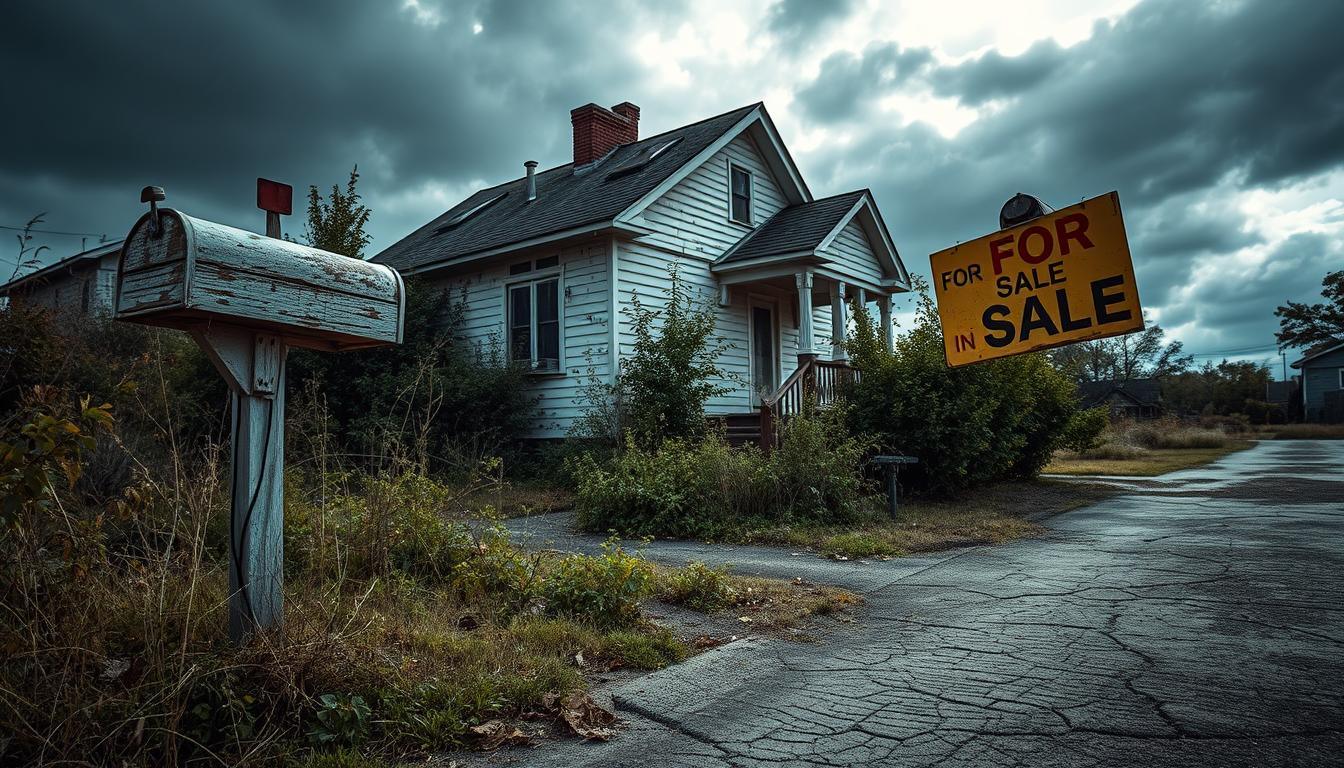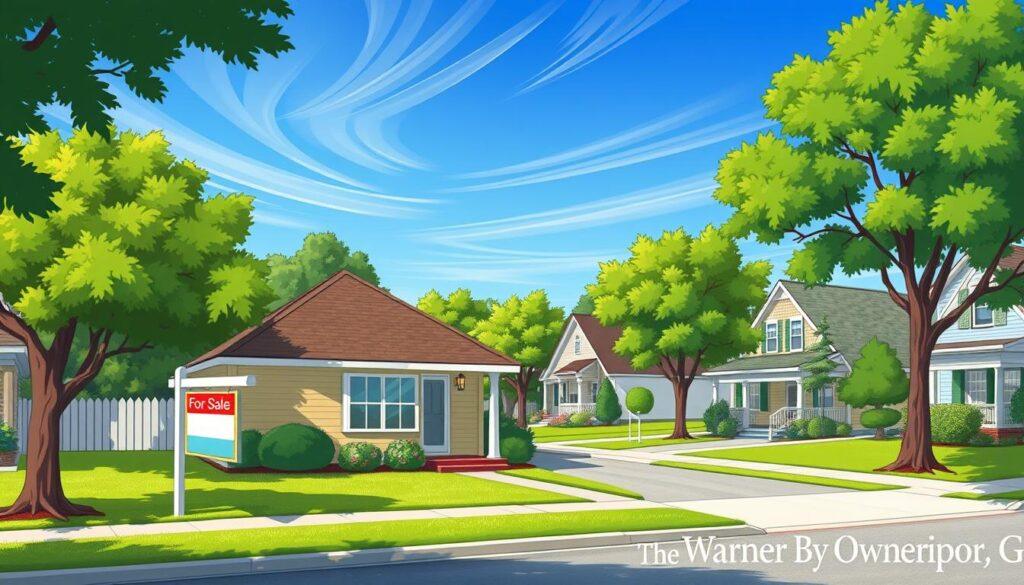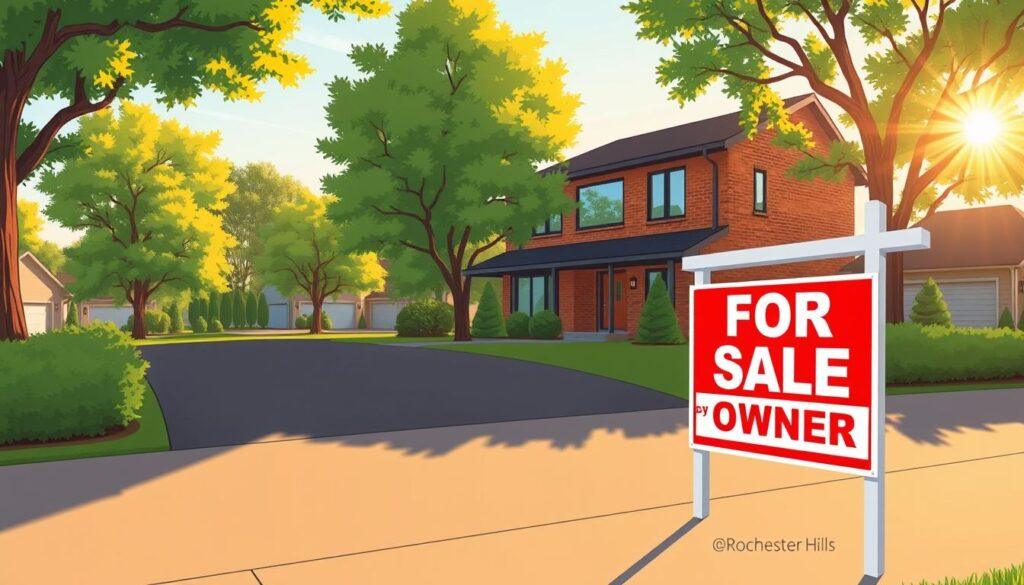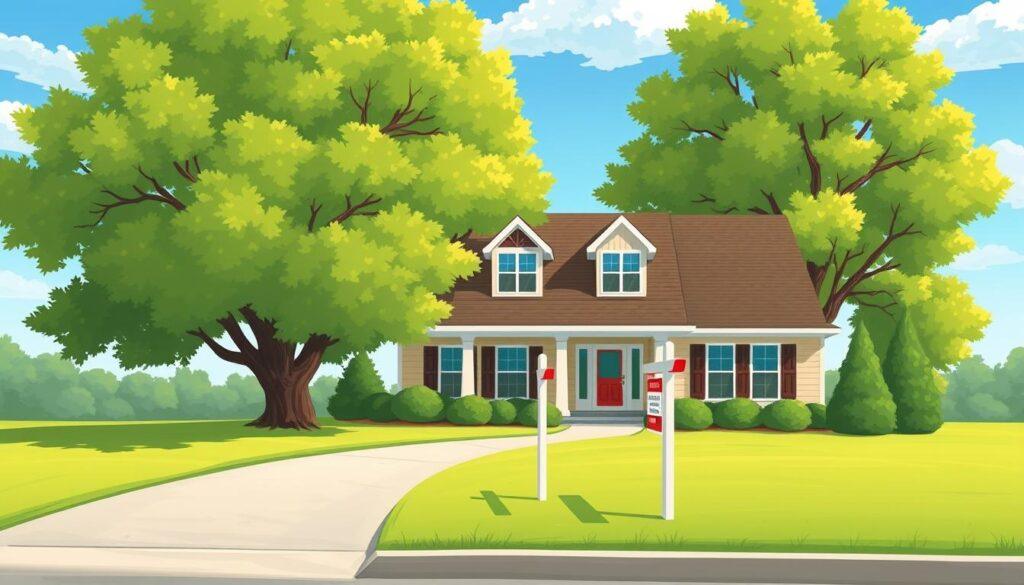Ever wondered why some homes sell fast while others stay on the market forever? The real estate market has its secrets. Things like too high prices, poor curb appeal, or needed repairs can scare off buyers. But, there are smart ways to sell even the toughest homes.
This article will dive into why some homes are hard to sell. We’ll look at ways to make them more attractive. And, we’ll explore other options to sell your property. Knowing why your home is hard to sell can help you find a way out.
Key Takeaways
- Multiple factors can render a house unsellable, including pricing and condition.
- Creative strategies can help in selling an unwanted property.
- Lowering the sales price can make a hard-to-sell home more appealing.
- Rent-to-own options can offer flexible avenues for potential buyers.
- Addressing curb appeal can significantly enhance first impressions.
- Working with cash buyers can facilitate quick sales, often below market value.
- Alternative sales methods, such as auctions or short sales, may be worth considering.
Understanding Why Your House Is Unsellable
When you’re trying to sell a house that’s hard to sell, it’s key to know why. Many things can make it hard to find a buyer. These include the price and the state of the market. Knowing these can help you make your house more attractive to buyers.
Common Reasons Homes Struggle to Sell
There are several reasons homes have trouble selling:
- Inaccurate Pricing: If you price your house too high, it can scare off buyers.
- Condition of the Property: A neglected house with problems or bad smells can turn buyers off.
- Neighborhood Appeal: A house in a bad area, near noise, or with crime can be hard to sell.
- Poor Marketing Techniques: Bad staging or photos can make a house look unappealing.
Impact of Market Conditions on Saleability
The market can greatly affect how easy it is to sell a house. In a buyer’s market, there are many houses for sale. Even good houses can be hard to sell because of all the competition.
But, there’s hope. By fixing common problems and working with real estate experts, you can sell your house. Understanding the challenges can help you tackle them. This way, you can sell your house more easily.
Identifying Issues That Affect Curb Appeal
Curb appeal is key when selling a home. Buyers make their first judgments by looking at the outside. A nice-looking house can make them want to see more. But a messy house might scare them off right away.
Knowing what makes a good first impression can help sell a house. It’s all about how the outside looks.
Importance of First Impressions
First impressions are everything when selling a home. Curb appeal is what catches a buyer’s eye first. Things like landscaping, how clean it is, and upkeep show if the house is well-cared for.
A house that looks good shows it’s been taken care of. But a house that looks neglected might make buyers worry. They might think there are bigger problems inside.
Simple Enhancements for Better Curb Appeal
Improving curb appeal doesn’t have to be hard. Small changes can make a big difference. Here are a few ideas:
- Lawn Care: Keeping the lawn neat makes the house look better.
- Fresh Paint: A new paint job on the front door can really help.
- Landscaping: Adding plants or flowers makes the house feel welcoming.
- Outdoor Lighting: Good lighting can show off the house’s best features and keep it safe.
- Cleanliness: Washing the outside can get rid of dirt and make it look new.
Putting effort into these small changes can help a lot. Good curb appeal can make a house look more appealing. It can also attract more buyers. Remember, buyers like houses that don’t need too much work right away.
How to Assess Your Home’s True Market Value
Knowing how to value your home is key to a successful sale. Accurate prices show your home’s true worth. They also draw in buyers, speeding up the sale.
One good way is to look at similar homes in your area. By using data from recent sales, you can set a fair price.
Researching Comparable Properties
Start by finding homes like yours. Look at size, features, and location. Websites like Zillow and Realtor.com have lots of info on sold homes.
This helps you price your home right. It makes it more attractive to buyers.
Consequences of Overpricing Your Home
Setting your price too high can slow down your sale. Studies show 70-80% of unsold homes are overpriced. High prices make buyers think you’re desperate.
This can hurt interest and make your home sit on the market longer. It’s important to price your home right to keep it competitive.
How To Get Rid Of An Unsellable House with Smart Strategies
Looking for ways to sell an unsellable house? You need smart strategies. These can make your home more appealing to buyers. Here are some ideas to boost your home’s market appeal.
Lowering the Sales Price: When and How?
Lowering the price might be needed to get buyers’ attention. A price cut can show your home is a good deal. It’s important to check the market and compare sales to find the right price.
Exploring Rent-to-Own Options
Rent-to-own is a great option for unsellable houses. It lets buyers rent now and buy later. This way, you get rental income and buyers get a chance to own a home.
Using Cash Buyers to Your Advantage
Cash buyers can make selling fast and easy. They offer quick deals with fewer problems. Homes for cash buyers sell quickly, helping you avoid long waits.
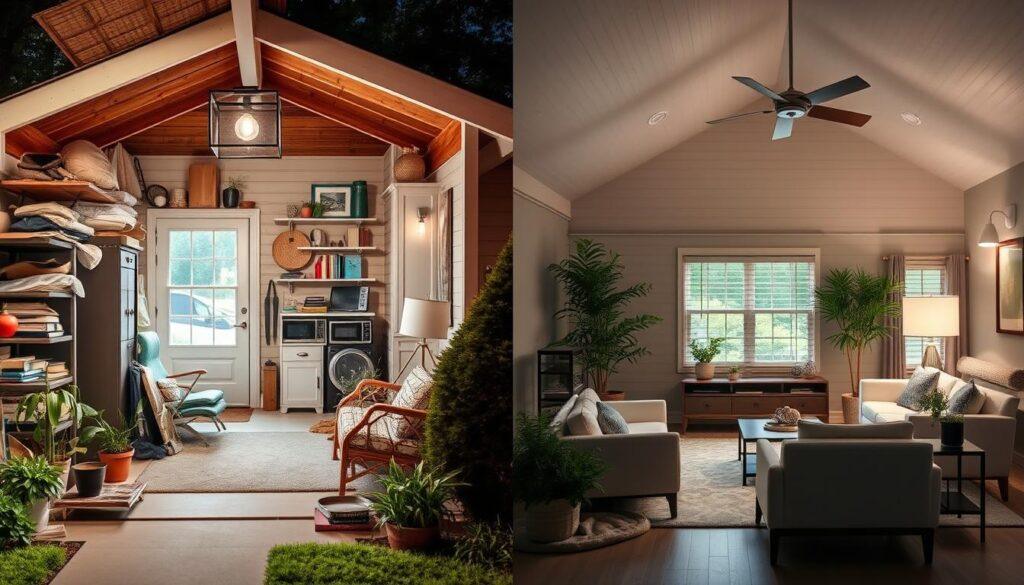
| Strategy | Description | Benefits |
|---|---|---|
| Lowering Sales Price | Adjusting the listing price to attract more buyers. | Increased interest and potential offers. |
| Rent-to-Own Options | Offering rental agreements with the option for purchase. | Catering to buyers needing time to secure financing. |
| Cash Buyers | Targeting buyers who can pay upfront. | Faster closing and fewer financing hurdles. |
Repairing Your Home to Make It Marketable
Getting your home ready for sale is more than just making it look good. You need to fix the important stuff too. Buyers want homes that need little to no work. Knowing which repairs to do and how to save money is key to selling your home fast.
Identifying Essential Repairs
Things like old systems, bad insulation, and cosmetic problems can hurt your home’s appeal. Talking to home inspectors or real estate pros can help figure out what repairs are must-haves. You should fix:
- Heating and air conditioning systems: An inspection costs about $200, but a new system can be up to $8,000.
- Minor electrical repairs: Small fixes cost around $300, but rewiring can be up to $15,000.
- Exterior painting: It boosts first impressions and might be tax-deductible.
Cost-Effective Renovations That Pay Off
You don’t need to spend a lot to make your home more appealing. Small changes can make a big difference. Here are some affordable upgrades that can make your home more attractive:
- Kitchen and bathroom updates: These areas usually get more attention from buyers than unique features.
- Home staging: Prices vary from $500 to $5,500, depending on the effort and skill involved.
- Appraisals: Costs range from $350 to $500, important for setting a fair selling price.
By fixing the essential stuff and doing some smart, affordable updates, you can make your home more appealing. This preparation can help you sell your home quickly and for a good price.
Utilizing Alternatives: Auctions and Investor Sales
When you can’t sell your house, looking at alternatives for selling can help. Auctions and finding investors are two good options. Each has its own pros and cons, so it’s important to think them through carefully.
Pros and Cons of Selling at Auction
Auctions can be a good way to sell. They create a competitive atmosphere, which can lead to higher bids. The benefits include:
- Speedy selling process with a set auction date.
- Immediate feedback on property value through bidding.
- Possibility of selling for a price above market value due to competition.
But, there are downsides too. These include:
- Auction fees that can reduce overall profits.
- Risk of not meeting reserve prices, resulting in no sale.
- Limited control over sale outcomes in a competitive bidding environment.
Finding the Right Investor for Your Home
Another good option is finding investors for your property. Professional real estate investors often look for homes in “as-is” condition. The benefits include:
- Fewer restrictions compared to traditional buyers.
- Potential for a cash offer, which offers immediate funds.
- Flexibility in negotiating terms of sale, which may include rent-to-own options.
Choosing the right investor is key. Look at their experience, offer conditions, and market reputation.

| Method | Advantages | Disadvantages |
|---|---|---|
| Auction |
|
|
| Investor Sale |
|
|
Understanding the Short Sale Process
A short sale can help homeowners in tough financial spots. It lets them sell their home for less than they owe, with the lender’s okay. This can be a better choice than foreclosure, which hurts your credit score more.
How to Qualify for a Short Sale
To qualify for a short sale, you need to show you’re really struggling financially. This could be because you lost your job, have too much debt, or can’t pay your mortgage. You’ll need to provide proof, like bank statements and a letter explaining your situation.
Working with Your Lender: Steps to Take
When dealing with your lender, clear communication is crucial. Start by talking to your lender about a short sale. They’ll tell you what they need and what you can expect. Here’s how to move forward:
- Gather all relevant financial documents.
- Submit a formal request for a short sale, including the evidence of hardship.
- Negotiate with lenders on pricing and terms, as they may offer more attractive financing during this process.
- Follow up regularly to ensure progress on the approval.
Knowing how short sales work can help you manage your financial risks. It’s a way to deal with your mortgage problems without the worst consequences. Here’s a look at how short sales compare to foreclosures:
| Aspect | Short Sale | Foreclosure |
|---|---|---|
| Impact on Credit Score | Less damaging, recovery possible in a few years | Severe drop, recovery can take up to seven years |
| Lender Costs | Lower costs due to avoidance of repossession fees | Higher costs including legal fees and maintenance |
| Property Condition | Often as-is, but possible repairs needed | May be left in poor condition |
| Finance Terms | Potential for lower interest rates | Limited financing options, higher risks |
Conclusion
Selling an unsellable house can be tough, but there are many ways to make it easier. First, figure out why your house is hard to sell. Look at the market, needed repairs, and how your house looks from the outside. These things can really help sell your house faster and better.
Try new ideas like virtual staging and painting to make your house look better. Changing how furniture is arranged and getting rid of clutter can also help. Setting the right price and looking into other ways to sell, like cash buyers, can also help you sell your house quickly and for a good price.
Getting rid of an unsellable house doesn’t have to be scary. By trying different things and learning about the market, you can sell your house successfully. With the right information, you can turn a tough situation into a good chance.

